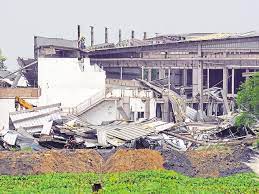NEW DELHI, Oct 30: The arbitration panel has decided Nano factory land compensation in favour of the Tata Motors. In its order released on Monday it decided that the West Bengal government has to pay Tata Motors a massive sum of ₹ 765.78 crore with 11 per cent interest from September 2016 for the closure of its Nano factory in Singur.
The unanimous decision in favour of the company came from a three-member Arbitral Tribunal. “With regard to the automobile manufacturing facility at Singur (West Bengal), this is to inform that the aforesaid pending Arbitral proceedings before a three-member Arbitral Tribunal has now been finally disposed of by a unanimous Award dated October 30, 2023 in favour of TML whereby Tata Motors has been held to be entitled to recover from the respondent (WBIDC) a sum of ₹ 765.78 crore with interest thereon @ 11% p.a. from September 1, 2016 till actual recovery thereof,” Tata Motors said in a note to the National Stock Exchange.
“Tata Motors has also been held to be entitled to recover from the respondent (WBIDC) a sum of ₹ 1 crore towards cost of the proceedings,” the note added.
Tatas had to abandon the Nano factory it planned in Bengal in 2008 following incessant protests spearheaded by Mamata Banerjee — who was then in the Opposition — and her Trinamool Congress. At the invitation from Mr Narendra Modi, who then was the chief minister of Gujarat, the factory was shifted to Sanand on the outskirts of Ahmedabad in Gujarat, abandoning the Singur facility.
After coming to power, the Trinamool government had offered Tatas alternative land for a factory. But the company had refused, saying it would prefer a compensation of ₹ 154 crore which it paid to the previous Left Front government in the state to acquire the land.
In 2016, the Supreme Court had ruled the Left Front government’s decision to acquire land in Singur for the Nano factory “grossly perverse and illegal” in view of non-compliance with provisions of the Land Acquisition Act. Tata Motors had defended the acquisition, contending that the government could not change its stance in the middle of a lawsuit just because a different political party had come to power.
The court said the government could do so if there is evidence that the acquisition was illegal. Tata then sought arbitration under its lease agreement with the state government that included it as a dispute-resolution mechanism. The Left Front had acquired agricultural land in Singur for the Nano factory, flagging it as the beginning of a policy shift to industrialise the state and boost its dying economy.
(Manas Dasgupta)

